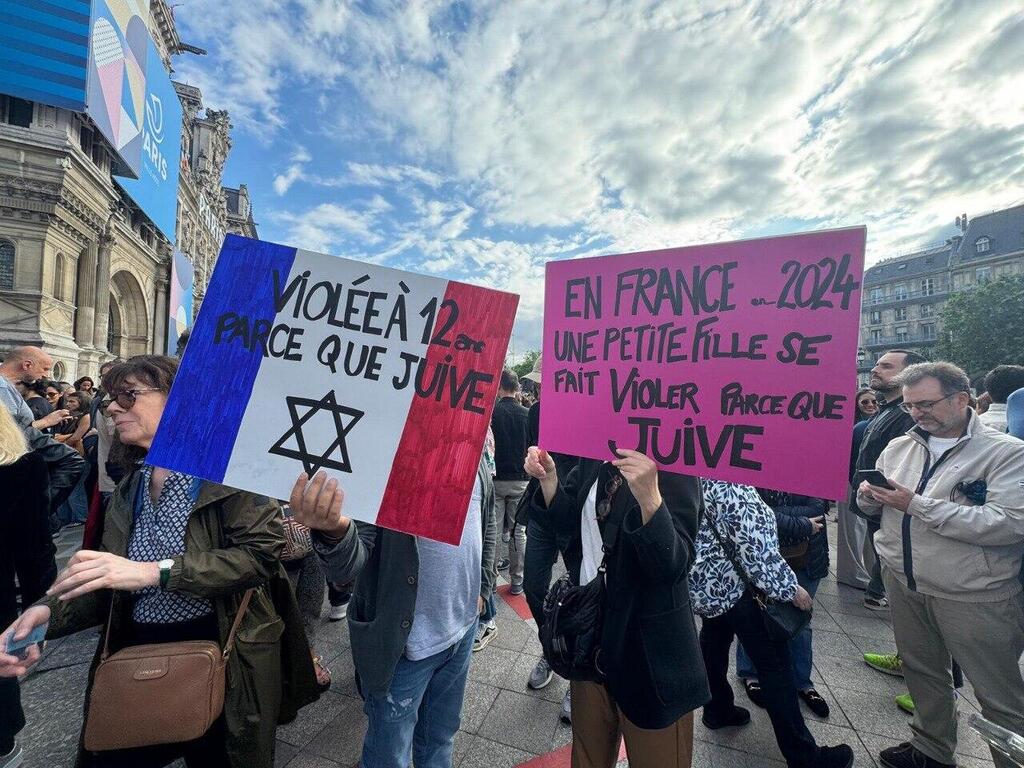The alleged rape of a 12-year-old Jewish girl in a suspected antisemitic attack has sent shockwaves throughout France and thrust concerns about antisemitism to the forefront of campaigning for the country's legislative elections.
The anti-immigration National Rally party, which has tried to shed historical links to antisemitism, is leading in preelection polling and has its first real chance of forming a government, if it comes out on top in the two-round elections that end on July 7. It would be the first far-right force to lead a French government since the Nazi occupation.
Far-left figures, meanwhile, have faced accusations of antisemitism linked to their response to Hamas' October 7 massacre against Israel and the ensuing war.
Concerns came to the fore after two adolescent boys in a Paris suburb were given preliminary charges this week of raping a 12-year-old girl and religion-motivated violence, according to prosecutors. Lawyer and Jewish leader Elie Korchia told French broadcaster BFM that the girl is Jewish and that the word Palestine was mentioned during the attack. The prosecutor's office did not specify the girl's religion or release her identity, according to policies for the protection of victims, as is standard practice for hate crimes in France.
Hundreds of people gathered Thursday evening around the Bastille monument in Paris to protest against antisemitism, in the second straight night of demonstrations. France has the largest Jewish population in Europe, but as a result of its own World War II collaboration with the Nazis, antisemitic acts today open old scars. France also has the largest Muslim population in Western Europe, and anti-Muslim acts have risen in recent years.
Politicians from all sides were quick to comment on the attack, notably after a surge in antisemitic acts in France since the start of the Israel-Hamas war.
French Prime Minister Gabriel Attal wrote on the social media platform X that the girl was raped because she's Jewish, while French President Emmanuel Macron called on schools to hold a discussion hour on racism and antisemitism.
Jordan Bardella, president of the National Rally, said that if elected, he would fight the antisemitism that has been plaguing France since October 7. In the wake of reports of the attack, Bardella announced that his party was withdrawing support for one of its candidates over an antisemitic message on social media posted in 2018.
His predecessor as party president and the National Rally's 2022 presidential candidate, Marine Le Pen, accused the extreme left of stigmatizing Jews and of instrumentalizing the Israel-Hamas conflict.
Serge Klarsfeld, known as a Nazi hunter who documented the Holocaust to enable the prosecution of war criminals came to Le-Pen's defense saying he will not hesitate to vote for the National Rally. Klarsfeld, 88, said when there's an antisemitic party and a pro-Jewish party, he will always vote for the pro-Jewish party.
Leftist leader Jean-Luc Malenchon denounced antisemitic racism, though the France Unbowed party which he formerly led has itself faced accusations of antisemitism linked to the Israel-Hamas war.
"There has never been any ambiguity in our denunciation of antisemitism," lawmaker Manuel Bompard of France Unbowed said on French news broadcaster La Chaîne Info on Wednesday, pushing back on accusations that his party's stance on antisemitism and the Israel-Hamas war contributed to an environment of insecurity for French Jews. "To have people believe that there would be a link between what happened and France Unbowed's political positions is offensive and inappropriate," he said.
Arie Alimi, lawyer and vice president of the League of Human Rights, called for a united front against the far right. "For some time now there is an awareness that there is antisemitism also on the left and that we need to address it," he said at Thursday's demonstration. "Today it's the camp of the left, of progressives that is gathered with all people who are worried by antisemitism and all kinds of racism in France, in a particular political moment with a far-right that could possibly come to power."
Although the alleged rape has heightened tensions regarding antisemitism in France before the June 30 and July 7 two-round parliamentary election, it is far from a new issue in French politics.
More than 180,000 people across France, marched in November to protest rising antisemitism in the wake of Israel's ongoing war against Hamas in Gaza.
Along with then-Prime Minister Elisabeth Borne and representatives of several other parties, Le Pen attended the march amid fierce criticism that her once-pariah National Rally party had failed to shake off its antisemitic heritage despite growing political legitimacy. Borne, the daughter of a Jewish Holocaust survivor, tweeted that "the presence of the National Rally is not fooling anyone."
Party founder Jean-Marie Le Pen, Marine Le Pen's father, was convicted repeatedly of antisemitic hate speech and played down the scope of the Holocaust. Marine Le Pen, runner-up in the last two presidential elections and likely a top contender in 2027, has worked to scrub the party's image, kicking her father out and changing its name from National Front to National Rally.
Attal announced in May that "366 antisemitic acts" were recorded between January and March this year, an increase of 300% compared to the first three months of 2023.
Antisemitism refers to hatred of Jews, but there is no universally agreed definition of what exactly it entails or how it relates to criticism of Israel. The Israeli government regularly accuses its opponents of antisemitism, while critics say it uses the term to silence opposition to its policies. The war has reignited the long debate about the definition of antisemitism and whether any criticism of Israel, from its military's killing of thousands of Palestinian children to questions over Israel's very right to exist, amounts to anti-Jewish hate speech.




